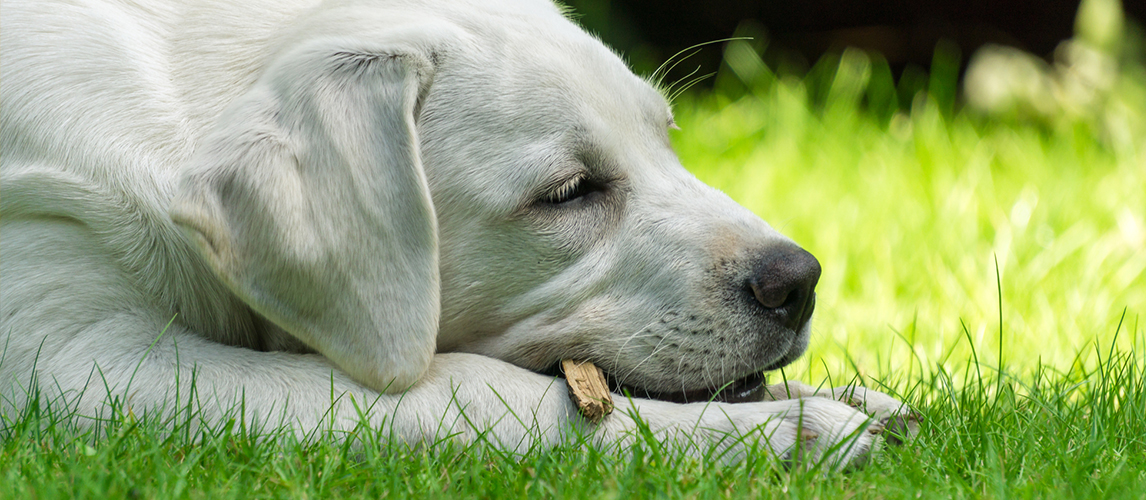We know that grapefruit is healthy for humans as one of our five a day. But is it healthy or even harmful to our canine friends?
Do Dogs Like the Taste of Grapefruit?
Dogs generally don’t enjoy the bitter, acidic taste of grapefruit and this is usually a good indication that food is not good for dogs – the dog’s taste buds naturally steer them away from foods that may be harmful. Of course, this isn’t always the case as anyone whose dog has stolen chocolate from the Christmas tree knows!

Is Grapefruit Good for Dogs?
So, if dogs don’t generally like the taste of grapefruit, should we still try to give it to them? Does it have any health benefits? The short answer is No. Grapefruit contains Vitamin C, which is great for humans as we are unable to produce our own. However, dogs, like most animals can produce their own Vitamin C. So, one of the main benefits of eating grapefruit for humans may actually cause harm to your dog as it may result in too much Vitamin C in your dog’s body. There are no other known benefits of eating grapefruit for dogs.
Is Grapefruit Bad for Dogs?
Grapefruit flesh is very acidic, which can cause digestive issues for dogs and the rind contains essential oils which are toxic to dogs. The main risk to dogs from eating grapefruit comes from an ingredient called Psoralen, which is very toxic to dogs. The peel, seeds, and pith are the most toxic parts as they contain the most Psoralen. If the peel and seeds are removed from the grapefruit, it does reduce the level of toxicity to some extent, but it is not worth the risk.
What Problems can Grapefruit Cause Dogs?
If your dog eats grapefruit, they are initially likely to show common gastrointestinal symptoms, such as vomiting, diarrhea, and nausea. As the toxicity progresses, they may become sensitive to light, start to drool excessively, and eventually, they may be unable to walk or stand. Grapefruit, or more specifically, Psoralen, can be fatal so if you suspect your dog has eaten grapefruit, you should take them to the vet immediately.
What Should You Do if Your Dog Eats Grapefruit?
If you discover that your dog has eaten grapefruit, you should call your vet to arrange an urgent appointment. Different parts of the grapefruit are harmful to dogs in different ways. For example, the flesh is very acidic but is not toxic like the rind. It is important to give your vet as much information as possible to help them know how to advise you.
How is Grapefruit Toxicity Diagnosed?
The vet will perform a physical examination of your dog and will also take a close look at any vomit your dog brings up. Any diarrhea will be collected and tests will be run to rule out any other causes. Dogs with grapefruit poisoning may become more sensitive to light which can cause skin reactions. If your dog is showing any skin-related symptoms, the vet will scrape off a thin layer of your dog’s skin for examination under a microscope to rule out any other causes.
Your vet will also run a series of blood tests to determine how your dog’s organs are handling the toxin and possibly a urine test to evaluate your dog’s kidney function.
You may also like our article on Dog Food for Kidney Disease.
How is Grapefruit Toxicity Treated?
The treatment your dog receives will depend on the symptoms they are currently showing. Your vet may induce vomiting. This involves giving your dog a drug that makes it vomit, emptying your dog’s stomach of any remaining pieces of grapefruit before the body absorbs it. This can only be done if you discover that your dog has eaten grapefruit and get veterinary assistance promptly.
If too much time has passed since ingestion, and your vet is unable to induce vomiting, they may give your dog activated charcoal. This acts to bind and neutralize the toxins of the grapefruit before the body absorbs it.
If your dog is already vomiting because of the fruit, the vet may give an antiemetic to stop the vomiting to help your dog feel better. Although it is important for your dog to get rid of the toxin from its body, it is also very important that your dog feels comfortable to give them the best chance of a full recovery. It is a delicate balance which your vet will consider carefully.
If your dog has vomiting and diarrhea which has resulted in them becoming dehydrated, the vet may give intravenous fluid therapies. This will also help to flush the toxins from your dog’s body.
If your dog is showing skin symptoms, caused by photosensitivity (sensitivity to light) the vet may prescribe a cream to apply to any affected areas which will help to calm any irritation or itching and speed up the healing process. If your dog is showing signs of photosensitivity, they will need to remain out of the sun as much as possible until the toxin has left their system.

Are There any Alternatives to Grapefruit?
The good news is that there are lots of safe alternatives to grapefruit! Orange or tangerine are better acidic fruits to give your dog, although these should still be given with caution and if your dog shows any signs of a digestive upset, you should stop straight away. Strawberries, blueberries, watermelon, and apples with the seeds removed can all be given to your dog safely in small quantities.
Conclusion
In summary, it is not a good idea to give grapefruit to your dog. It has no health benefits for dogs and parts of it are very toxic. If your dog does eat grapefruit, the prognosis for a full recovery is usually good if treatment is received promptly. If your dog ingests a large amount of grapefruit or does not receive prompt veterinary care, the prognosis declines.
Sources
- Grapefruit Poisoning in Dogs, WagWalking
- Healthy Snack Ideas for Dogs and Cats, PetMD
Note: The advice provided in this post is intended for informational purposes and does not constitute medical advice regarding pets. For an accurate diagnosis of your pet's condition, please make an appointment with your vet.







